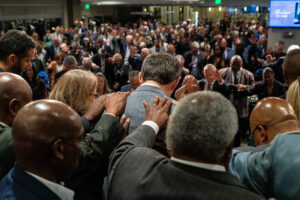
THOUSAND OAKS, Calif. (BP)–The sweeping Civil War epic begins in early 1861 and continues through 1863, just prior to the Battle of Gettysburg. Focusing on the leadership of the North’s Col. Joshua Lawrence Chamberlain (Jeff Daniels), one of the Union’s finest military leaders, and two extraordinary Confederate generals, Robert E. Lee (Robert Duvall) and Thomas “Stonewall” Jackson (Stephen Lang), the story examines in detail the strategies, sacrifices and religious nature of these three men.
At 3 hours and 49 minutes, with a built-in 12-minute intermission, it is, alas, not a perfect film. Nearly every conversation in the first half has the characters speaking in platitudes. While this reads well in history books, in everyday conversation such dialogue often comes across as a bit heady — especially if overused.
When Stonewall loses an arm in battle, for instance, Lee responds to the news with “Jackson lost his left arm, and I have lost my right.” Okay, that lofty quotation was actually said, but Duvall’s general is given little to say other than such somber bon mots. There is simply no natural dialogue used to humanize Lee in this interpretation. The film gives the impression that if a cook had asked, “General, do you want chicken tonight?” Lee would have avoided a simple declarative yes or no in favor of a more esoteric response such as, “If a soldier dies while supping, rest assured, his boots are polished.” With such fortune cookie bromides, he begins to sound like Virginia’s answer to Charlie Chan.
Generals Jackson and Chamberlain also communicate as if they were being shadowed by documentarian Ken Burns. Certainly, these men were profound, their thoughts substantial, but the film’s verbal exchanges make them sound like walking monuments. They spout one melodramatic homily after another, with their adjutants listening intently, nodding as if it were a Zig Ziglar conference.
Writer/director Ron Maxwell, dedicated to realism down to the correct uniform buttons, incorrectly theorizes that the inclusion of every historic comment attributed to these men is necessary to pay a respectful homage. Profundity is generally more so when offered in small doses. In other words, less is more. And therein lies the film’s trouble — it’s just too much: too verbose, too long and too politically correct.
There are three major conflicts represented in graphic detail. In actuality, these battles continued for days under the harshest of conditions. And Maxwell does his best to make those reenactments last nearly as long. While I think one extended action sequence would have been sufficient to make the point, Maxwell makes sure his war-is-hell theme is not missed. “But, Phil, it’s about the Civil War.” Yes, but we’re not watching a war, we’re watching a movie. The art of moviemaking is generally more effective when it’s more controlled. Again, less could have been more.
My third problem, ironically, had to do with the spiritual insights derived from historical accounts of these men. Lee and Jackson, as well as most of the other central characters, were devout, Bible-toting, prayer-reciting upholders of the faith. Trouble is, the film’s spiritual emphasis seems forced rather than a revealing expression of America’s religious direction during that era. Superficial wouldn’t be the correct adjective to describe the film’s theological representation, because it is done with a sincere effort on everyone’s part to relay Christianity’s impact. Indeed, it is revealing as it shows the difference between that generation and today’s social mores.
Perhaps the unreal feel of these resolutions rests with the actors themselves. Their delivery just wasn’t convincing.
During the interviews, it was obvious that the actors were genuinely moved by the religious fervor of their characters. And though no Christian press member pointedly asked, “Are you a Christian?” those interviewed were certainly given opportunity to declare a statement of faith. But with the exception of director Maxwell and actress Donzaleigh Abernathy (daughter of civil rights leader Ralph Abernathy), a couple of cast members tended toward New Age philosophies, while the others remained noncommittal about their personal beliefs. One of the few things an actor can’t fake is a spiritual revelation.
Well, there you have my difficulties with Ted Turner Pictures’ “Gods and Generals.” Not nearly as moving, enlightening or dramatically fulfilling as the PBS TV-documentary “The Civil War” of a few years back, Mr. Maxwell’s honorable attempt misses the mark by trying too darn hard to satisfy historians and mollify politically correct activists. But before you write this film off, read on.
Despite my frustration and what some might say picayune complaints, “Gods and Generals” stands as a thoughtful, perceptive history lesson that not only profiles the moral character of the men and women of that time, but also lavishly expounds on their religious convictions. What’s more, in the second half, the characters are allowed to become more human, adding dimension and resonance to the production.
I maintain that it could have been a better film. It should have been shorter and therefore more concise. And it should have been a touch more human and therefore more poignant. But it is a heartfelt film with an enlightening message. The production values, including the cinematography, art direction and musical score, are each outstanding.
Want movies where spouses reflect a loving and loyal marital relationship? Want movies that lack profanity? Want movies that profess a reverence for God and exalt justice and honor? Then here’s your chance to support one that does all that.
PG-13 (The film depicts wartime atrocities and sustained battle sequences, giving us insight into the torturous conditions both Yankees and Rebels were forced to endure. But it avoids the R-rating by subduing its gore and carnage. It makes a clear statement of the wrongs of slavery and how even good men can be blinded by evil).
–30–
Boatwright reviews films from a Christian perspective. For more information about his service, go to www.moviereporter.com.















